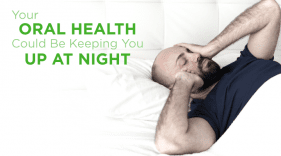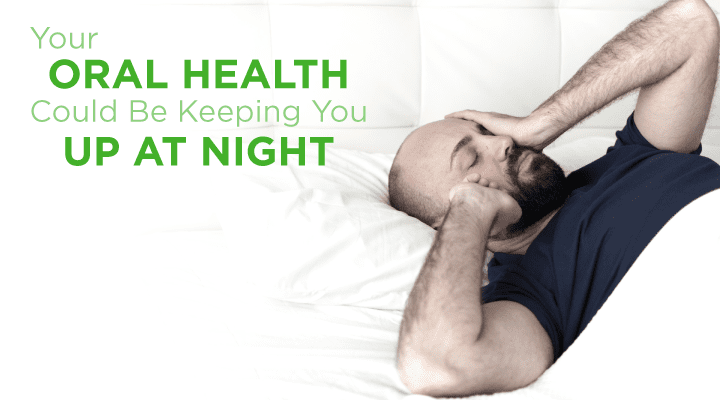Your Oral Health Could Be Keeping You Up at Night

Do you snore or grind your teeth while sleeping? Not only does this lead to a poor night’s sleep, but it can also wake you or your partner up night after night. If your snoring or teeth grinding is impacting your sleep, don’t ignore it any longer.
Your dental health and sleep habits could be signaling that an underlying condition is impacting your rest, like sleep apnea — though not all snoring is a sign that something is wrong.
About 40% of adult men and 24% of adult women snore every night. When we’re snoozing and snoring, the airflow from breathing causes the tissue in the back of our throat to vibrate. The narrower your airway is, the louder your snoring will be.
About half of individuals who snore also have a sleep disorder. Sleep apnea is a condition where your airway becomes too narrow and closes, causing you to make more of a choking noise and wake up with a start. If you wake up in the middle of the night gasping for air, have ongoing sleepiness during the day, and sleep with your mouth open, speak with your physician and your dentist to see if you may have a sleep disorder.
Diagnosing Sleep Apnea
After evaluating your symptoms, your dentist or primary care physician may suspect you have sleep apnea and refer you to a sleep disorder center*. There, you will spend the night as you normally would – sleeping – while specialists monitor you. The sleep specialists will watch everything from your heart, lung, and brain activity to your breathing patterns, body movements, and blood oxygen levels while you’re asleep.
If they believe your sleep is abnormal and you have sleep apnea, a common treatment is using a positive airway pressure device (CPAP) while sleeping. This device fits over your head and nose, and may also cover the mouth. It gently blows air into your airway, helping to keep it open and avoid narrowing during sleep.
One in four patients with sleep apnea also habitually grind their teeth at night. Teeth grinding, or bruxism, can have immediate negative side effects like headaches and jaw pain, as well as long-term side effects like temporomandibular joint disorder, or TMJ. This specific joint connects your jaw to your skull, and it can become injured if you continuously grind your teeth. Not everyone who grinds their teeth develops TMJ, though.
*An at-home test may also be an option.
Nighttime Teeth Grinding and your Oral Health
Another repercussion of continued teeth grinding each night is damaged teeth. If you’re grinding, gnawing, or clenching, you can wear down your teeth over time. It’s important to contact your dentist or primary care physician if you experience:
- Continued teeth grinding or clenching while you sleep
- The wearing down of your tooth enamel, exposing deeper layers of the teeth or receding gum lines
- Increased tooth sensitivity
- Sleep disruption
- Headaches in the temples
- Damaged tissue on the inside of the mouth after sleeping
- Soreness in the jaw, neck or face after sleeping
- Pain similar to an earache
- Tight jaw muscles
- A locked jaw that won’t open or close completely
- Teeth that are flattened, fractured, chipped, or loose
Wearing a properly-designed mouth guard while sleeping can make a world of difference for a habitual teeth grinder. Your dentist and/or primary care physician can help you choose the best treatment for addressing oral health issues that keep you up at night.
Need to find a dentist near you to help address nighttime teeth grinding or habitual snoring? Click here!
Related stories
-
How your oral health affects Alzheimer’s
Alzheimer’s Disease is a public health crisis in the United States, and according to the Alzheimer’s Association, … Read More
-
Dry Sockets and Wisdom Teeth
Getting dry sockets after wisdom teeth extraction is one of the most painful things that can happen … Read More
-
What Wisconsin Winters Can Do To Your Teeth
*Updated December 2021 Just like your teeth can be sensitive to ice cream, cold temperatures can also … Read More
Sign Up Now
Most Liked
- 1 Do Expiration Dates on Dental Products Matter? 305 Likes
- 2 Is Activated Charcoal Safe for your Smile? 167 Likes
- 3 Crazy and Cool Fish Teeth Facts 92 Likes
- 4 What Are Tonsil Stones? 81 Likes
- 5 Delta Dental Protects Your Eyes with DeltaVision® Coverage 74 Likes
- 6 The In-between Tooth: Guide to Bicuspids 53 Likes
- 7 Recipe: Quick Pumpkin Pudding 49 Likes
- 8 Bad Taste After Brushing? Common Explanations 44 Likes
- 9 People with Dental Benefits are Healthier 40 Likes
- 10 Own Your Oral Health: Subscribe now for tips to ensure a bright smile 39 Likes




